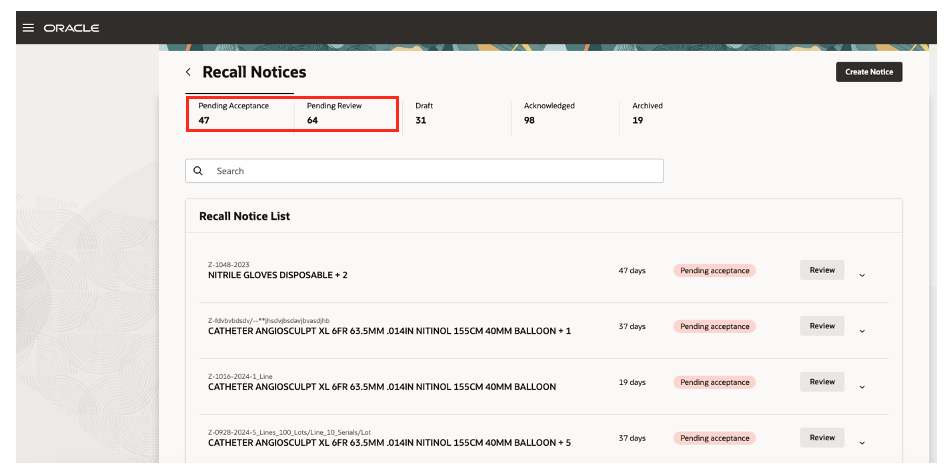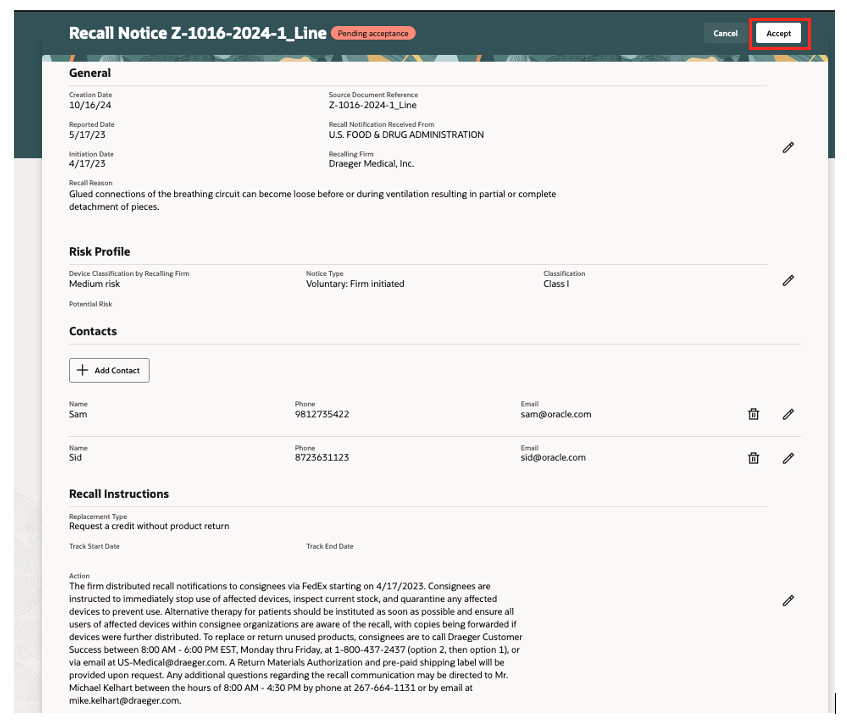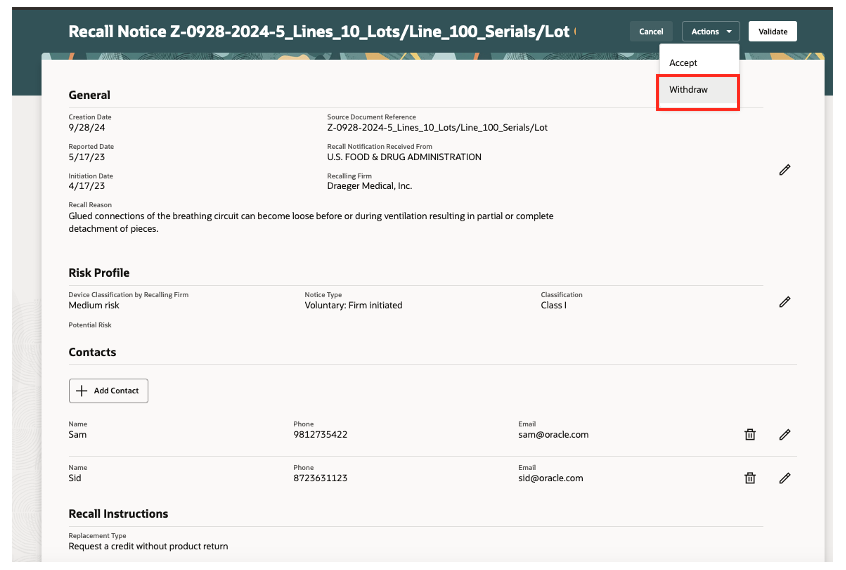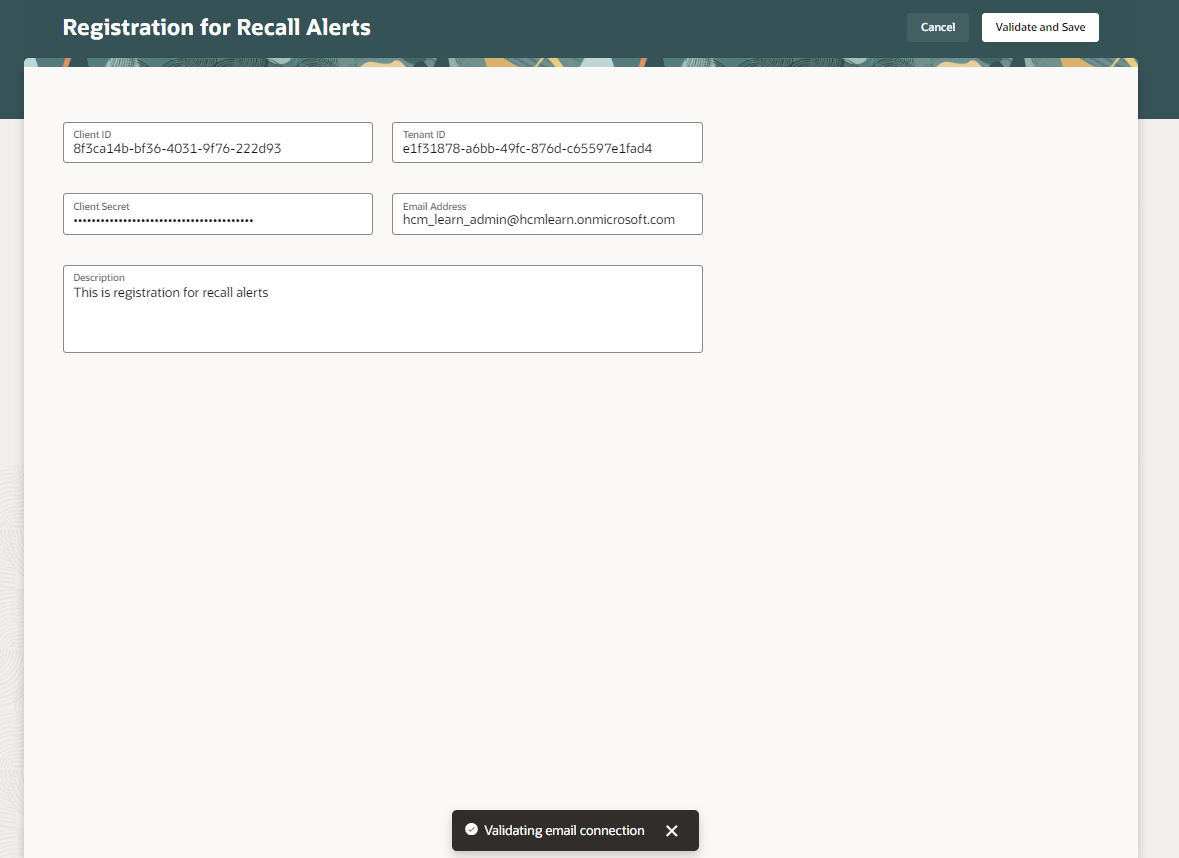Capture Recall Notices from the U.S. Food and Drug Administration Curated and Communicated by Oracle
You can now automatically receive recall notices ingested into your application that have been published by the U.S. Food and Drug Administration (FDA) by subscribing to the Oracle content curation service. The following features have been added to the product in this release to support the Oracle content curation service:
- Oracle Content Curation Service
- Ingesting Recall Content from the Curation Service
- Identifying if the Recalled Part is Relevant During Ingestion
- Automatic Assignment of Business Units
Oracle Content Curation Service
The Oracle Content Curation Service team plays a critical role in tracking and managing FDA-published recalls for medical devices and other healthcare products. This team is dedicated to:
- Continuous Recall Monitoring: Regularly tracking FDA recalls ensuring timely awareness of affected products.
- Detailed Data Curation:
- Reviewing each recall to capture all relevant data accurately.
- Ensuring each data element (such as part numbers, lot numbers, and serial numbers) is correctly mapped to the corresponding recall field.
- Verifying data accuracy, identifying updates, and flagging duplicate entries to maintain data quality.
- Multi-source Validation: Utilizing multiple sources to confirm recall details, and, when necessary, directly communicating with the recall-initiating firm for clarification.
- Approval and Communication:
- Following a structured approval process for curated recalls.
- Notifying customers via email, sent to a registered email associated with the customer’s account on their application.
By streamlining recall data management and communication, the Oracle Content Curation Service team ensures that customers are informed of relevant recalls efficiently, with the highest standard of data accuracy and reliability.
Ingesting Recall Content from the Curation Service
When a recall notification is sent to the designated recall email address, it is automatically received and processed by the recall management application within the customer’s environment. The application scans incoming emails, parses their contents, and imports them as recall notices within the recall management application. This automated process runs on a scheduled job, ensuring that recall notices are consistently updated and accurately captured in your application.
Identifying if the Recalled Part is Relevant During Ingestion
In the recall notice ingestion process, the application validates recalled parts to ensure correct identification by cross-referencing specific item identifiers, including the Oracle item number, supplier part number, manufacturer part number, UDI or GTIN. These identifiers are either configured in trading partner relationships within the Product Information Management (PIM) cloud application or have been utilized in transactions such as purchase orders and agreements within the Procurement Cloud Application.
Once the correct item identifier is derived, the application then checks whether these items were received during the designated recall tracking period. The recall notice is classified based on the following criteria:
- Relevant Recall Notice:
- If at least one line in the recall notice includes an item identifier that has been previously received during the tracking period, the recall notice is deemed relevant.
- This relevant recall notice is then assigned a status of Pending Acceptance to indicate that further action may be required.
- Irrelevant Recall Notice:
- If none of the lines in the recall notice contain a valid item identifier or if the identified items were not received during the tracking period, the notice is marked as irrelevant.
- The status for these notices is set to Pending Review, highlighting that no immediate action is necessary unless further review suggests otherwise.
This process helps streamline the recall notices management by ensuring only pertinent notices receive attention, thereby, improve operational efficiency and compliance.

Relevant (Pending Acceptance) and Irrelevant (Pending Review) Tabs
The Recall Manager can focus their attention on the relevant recalls by reviewing recalls in “Pending Acceptance” and then simply accept them so that they become eligible for tracing the material and managing the disposition of affected parts.

Accepting a Recall
For irrelevant recalls that are in “Pending Review”, you can review the recall details as well.
Recall Managers may want to verify:
- if there is any misconfiguration in the product master, that is, product master does not have the required trading partner relationship or the item does not have the required extensible flex field attribute mapping. Therefore, a match is not being found.
-
make the necessary changes and validate the item again or withdraw the recall if the recall manager believes that they are irrelevant.
Recalls that are deemed irrelevant, that are not withdrawn, continue to be re-evaluated by a scheduled process to determine if over time the recall becomes relevant.

Withdrawing a Recall
Automatic Assignment of Business Units
Prior to this release, you had to manually assign the business unit in a recall notice. However, with the new update, the business unit is automatically assigned based on the association of the item to the inventory organization. This enhancement reduces manual intervention, streamlines the recall process, and improves efficiency.
Oracle’s content curation service ensures high-quality data, even when the FDA publishes recall notices with missing and poorly structured data. By having high quality recall data, you ensure that downstream processes for tracking, tracing, and managing defective parts are solid.
Oracle’s content curation service provides an efficient solution to manage recall notices, eliminate manual processes and reduce integration complexities. With this service, all relevant recall data is automatically delivered which minimizes the administrative tasks and frees up the resources for essential recall management operations to directly impact patient care.
This service also includes an upfront validation capability, that allows you to quickly identify the recalls relevant to your operations. This targeted focus helps you avoid information overload and enables you to act promptly on the most critical recalls. The application also continuously evaluates the past recalls that were deemed irrelevant to determine if they are now relevant, so that the Recall Manager does not have to continuously check on the past recalls.
Overall, Oracle’s content curation service not only reduces administrative burdens but also optimizes your operational workflow, allowing your team to allocate more time to strategic and high-value tasks. This proactive recall management approach mitigates risks, ensures compliance, and supports faster, more informed decisions across your organization.
Steps to Enable
Use the Opt In UI to enable this feature. For instructions, refer to the Optional Uptake of New Features section of this document.
Offering: Manufacturing and Supply Chain Materials Management
To enable this feature, do the following:
-
Identify or Create a MS Outlook client email address to receive the recall notices from the Oracle Content Curation Service. If it’s necessary to create the client email, you will need to work with your IT MS Outlook team to get this email account configured. Based on the FDA recall data research. the email client is estimated to receive around 8 emails a day.
-
For the ESS job to ingest the recall email from the curation service, you must ensure that the Azure Graph API is setup, so that the email is accessible. Your IT team (Azure Administration) will have to perform this setup. Microsoft Setup Details can be found here.
-
Complete the registration to receive email communication about recalls from the Oracle Content Curation Service and to get these recall notices automatically ingested into your recall management application.
-
In the Setup and Maintenance work area, go to the following:
-
Offering: Manufacturing and Supply Chain Materials Management
-
Functional Area: Product Recall Management
-
Task: Manage Registration to Receive Recall Alerts
-
-
Accept the third-party service terms of use
-
Enter the Client ID, Tenant ID, Client Secret that you receive from your Azure Administrator. The MS client details are used to retrieve the emails, parse the content and import the recall notices into the Oracle Cloud application.
-
Enter the MS Outlook email address to which the recall alerts will be sent.
-
Click Validate and Save.
-

Oracle Curation Service Registration
- Configure the recall parameters:
- In the Setup and Maintenance work area, go to the following:
- Offering: Manufacturing and Supply Chain Materials Management
- Functional Area: Product Recall Management
- Task: Manage Product Recall Parameters
- Select the item master organization under the Global tab and save the record.

Manage Recall Parameters
- Perform the steps mentioned here which enables the application to validate the recalled parts upfront, does item match and identifies the recall notices that are relevant for you.
- Schedule the Ingest Oracle Curated Recall Notices job by navigating to Tools > Scheduled Processes.
Key Resources
- Oracle Supply Chain Management Cloud: Using Product Recall Management guide, available on the Oracle Help Center.
Access Requirements
Users who are assigned with configured job role that contains the following privileges can access this feature:
-
Recall Management Console Inquiry (ENQ_MGMT_CONSOLE_INQUIRY)
-
Manage Product Recall Notices (ENQ_MANAGE_PRODUCT_RECALL_NOTICES)
-
Import Product Recall Notices (ENQ_IMPORT_PRODUCT_RECALL_NOTICES)
-
Get Enterprise Structures Using REST Service (FUN_GET_ENTERPRISE_STRUCTURES_REST_SERVICE_PRIV)
-
Manage Scheduled Job Definition (FND_MANAGE_SCHEDULED_JOB_DEFINITION_PRIV)
-
Access FSCM Integration Rest Service (FUN_FSCM_REST_SERVICE_ACCESS_INTEGRATION_PRIV)